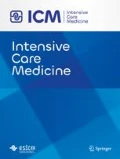Abstract
Objective
Psychologically stressful situations, a physically demanding workload and a high requirement for technological skills can lead ICU caregivers to burnout. The aim of our study was to evaluate their level of burnout as well as the related factors.
Design
A self-administered anonymous questionnaire.
Setting
A 20-bed surgical ICU in a university hospital.
Patients and participants
Nurse assistants, nurses.
Interventions
None.
Measurements and results
Ninety-seven of 107 questionnaires (91%) were returned. Of the members of ICU nursing team, 28% showed a high level of burnout. They reported a number of concerns, and that they felt discomfort and suffering. There was a discrepancy between the factors felt to be important by them and those statistically related to the burnout. Among the reported concerns, only the lack of patients' co-operation, the organization of the service and the rapid patient turnover were independently associated with a high level of burnout. As many as 49% of the nursing team felt stressed.
Conclusions
Almost a third of the ICU nursing team showed a high level of burnout. The factors felt to be important may not be those related to burnout. Since the well-being of the nursing team is important for the quality of care, corrective actions against the related factors should be sought in order to alleviate the suffering.
References
Coomber S, Todd C, Park G, Baxter P, Firth-Cozens J, Shore S (2002) Stress in UK intensive care unit doctors. Br J Anaesth 89:873–881
Aiken LH, Clarke SP, Sloane DM, Sochalski J, Silber JH (2002) Hospital nurse staffing and patient mortality, nurse burnout, and job dissatisfaction. J Am Med Assoc 288:1987–1993
Shanafelt TD, Bradley KA, Wipf JE, Back AL (2002) Burnout and self-reported patient care in an internal medicine residency program. Ann Intern Med 136:358–367
Levy MM (2004) Caring for the caregiver. Crit Care Clin 20:541–547
Ramirez AJ, Graham J, Richards MA, Cull A, Gregory WM (1996) Mental health of hospital consultants: the effects of stress and satisfaction at work. Lancet 347:724–728
Campbell DA, Sonnad SS, Eckhauser FE, Campbell KK, Greenfield LJ (2001) Burnout among American surgeons. Surgery 130:696–702
Kluger MT, Townend K, Laidlaw T (2003) Job satisfaction, stress and burnout in Australian specialist anaesthetists. Anaesthesia 58:339–345
Penson R, Dignan F, Canellos G, Picard C, Lynch TJ (2000) Burnout: caring for the caregivers. Oncologist 5:425–434
Embriaco N, Azoulay E, Barrau K, Kentish N, Pochard F, Loundou A, Papazian L (2007) High level of burnout in intensivists: prevalence and associated factors. Am J Respir Crit Care Med 175:686–692
Poncet MC, Toullic P, Papazian L, Kentish-Barnes N, Timsit JF, Pochard F, Chevret S, Schlemmer B, Azoulay E (2007) Burnout syndrome in critical care nursing staff. Am J Respir Crit Care Med 175:698–704
Maslach C, Schaufeli WB, Leiter MP (2001) Job burnout. Ann Rev Psychol 52:397–422
Sauter S, Hurrell J, Murphy L, Levi L (1998) Psychosocial and organizational factors. In: Encyclopaedia of Occupational Health and Safety, 4th edn. International Labour Office, Geneva
Folkman S, Lazarus RS, Gruen RJ, Delongis A (1986) Appraisal, coping, health-status, and psychological symptoms. J Pers Soc Psychol 50:571–579
Ramaciotti D, Perriard J (2000) Les coûts du stress en Suisse. State Secretariat for Economic Affairs (SECO), Bern
Canouï P, Mauranges A (2001) Le syndrome d'épuisement professionnel des soignants: de l'analyse du burn-out aux réponses. Masson, Paris
Vahey DC, Aiken LH, Sloane DM, Clarke SP, Vargas D (2004) Nurse burnout and patient satisfaction. Med Care 42:57–66
Linzer M, Visser MRM, Oort FJ, Smets EMA, McMurray JE, de Haes H (2001) Predicting and preventing physician burnout: results from the United States and the Netherlands. Am J Med 111:170–175
Acknowledgements
The authors thank all the caregivers of the Surgical Intensive Care Unit for having participated in this study. This work was presented in part at the Annual Congress of the European Society of Intensive Care Medicine (ESICM), September 2004, in Berlin (Germany).
Author information
Authors and Affiliations
Corresponding author
Additional information
This article is discussed in the editorial available at: http://dx.doi.org/10.1007/s00134-007-0908-4.
Electronic supplementary material
Rights and permissions
About this article
Cite this article
Verdon, M., Merlani, P., Perneger, T. et al. Burnout in a surgical ICU team. Intensive Care Med 34, 152–156 (2008). https://doi.org/10.1007/s00134-007-0907-5
Received:
Accepted:
Published:
Issue Date:
DOI: https://doi.org/10.1007/s00134-007-0907-5

